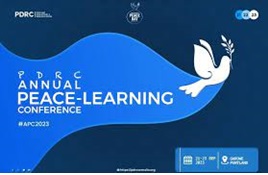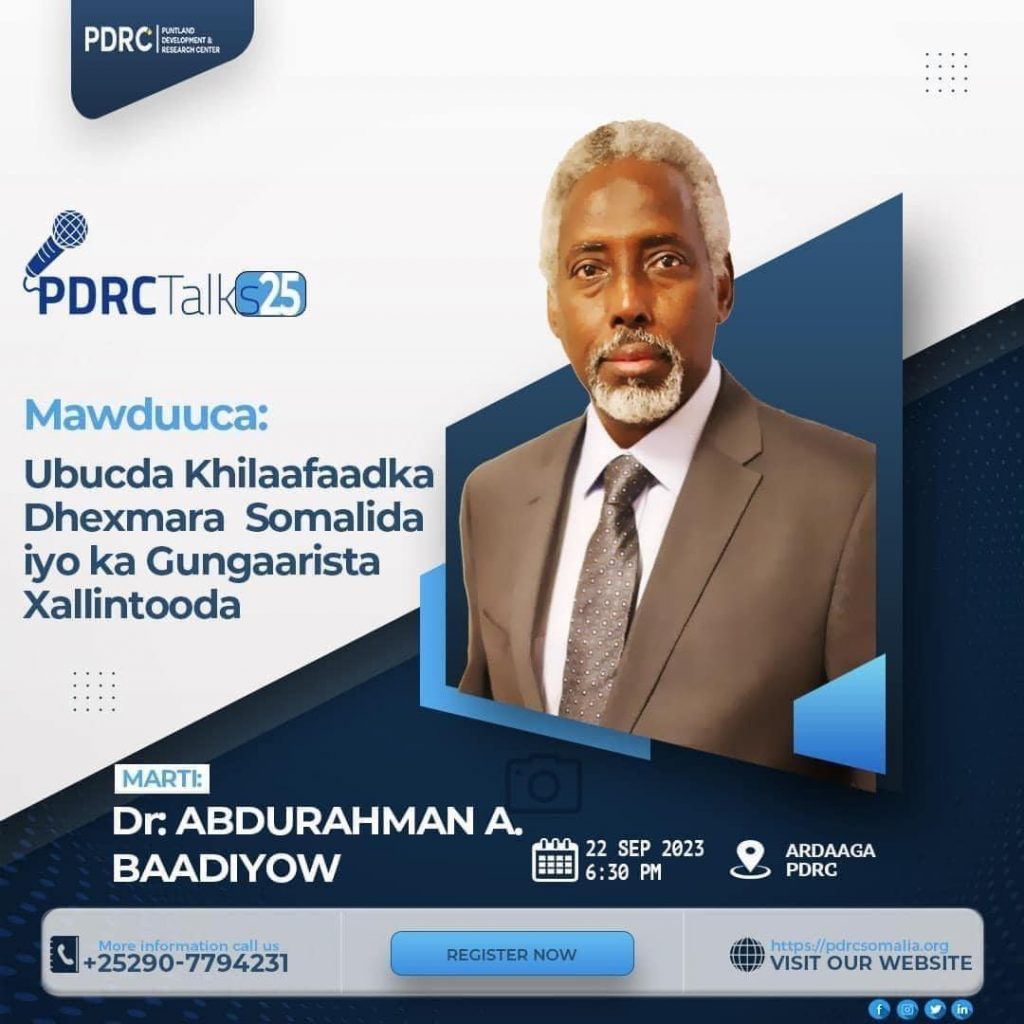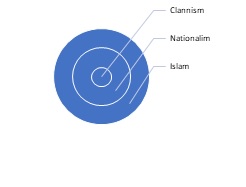Prof. Abdurahman Baadiyow
Puntland Development and Research Center (PDRC) is a research institute established on October 30, 1999, to promote peacebuilding, democracy, and respect for human rights. The Programs of PDRC were mainly focused on the Puntland state; however, on its 25th anniversary, PDRC undertook a new initiative to hold an annual conference on peace and reconciliation in the wider Somali region and the Horn of Africa region. The inaugural annual conference was held in Growe on 21-23 September of this year. More than 200 persons participated, including scholars, researchers, peacebuilding partitioners, students, and the broader public from different regions. Initially, the director of PDRC, Mr. Ali Farah, offered welcoming remarks, and other dignitaries, such as the PUNSA Chairman Abdirahman Abdirizak, also addressed and welcomed participants. The Deputy President of Puntland, HE Ahmed Karash, officially opened the conference.

The venue of the conference was the Maansoor Hotel conference hall, where 25 years of calendar of peace-building activities of PDRC were illustrated. I was delighted to be invited as a keynote speaker of the PDRCTalks program, in which public lectures are delivered, and discussions are held on various topics of peacebuilding and development. The chairman of the Board of PDRC, Prof. Abdirizak Jurile, a colleague and a Senior Advisor to the Somali President on democratization and good governance, officially invited me. I am well familiar with Puntland even before the establishment of Puntland state. Being the director of Mery-USA for Aid and Development, an American NGO, I opened the first health center to cure tuberculosis in Bossaso in 1994.
I contributed to developing the civil society organization in the education sector. For example, Mogadishu University, which I am its chairman of the Board, opened its branch in Bossaso in 2008. This branch is now an independent university titled the Red Sea University. Moreover, I contributed to establishing Tadamun Charity, which is one of the most prominent NGOs working in the education sector and other fields. Furthermore, my relationship with PDRC is well-rooted, and I have visited it many times. Its first Director and former minister of education, Abdurahman Shuuke was my friend.
Indeed, PDRC was one of three peace institutions established by the war-torn society in the 1990s, which included CRD in Mogadishu and Peace Academy in Hargeisa. 25 years of continuous work on peace and reconciliation focusing on Puntland, PDRC’s new initiative to hold an annual conference participated by scholars and peace practitioners is highly appreciated. In this yearly conference, scholars from all Somali regions, Kenya, Ethiopia, and Eritrea have presented their research papers and shared their experiences. Peace reactionaries also shared their experiences in resolving many communal conflicts. In the local conflict resolution processes, the indispensable role of women’s peace actions and the role of the youth groups were illuminated and showcased through films and demonstrated by the various actors.
During the three days of the conference, the hospitality of the PDRC, members of the Puntland ministries, and the city Growe population was extraordinary and remains a mark in our memory.
My contribution as a keynote speaker on the PDRCTalks program, which was interjected within the Conference, was to illuminate the root causes of the Somali conflicts. To critique the conventional and simplistic explanation of the Somali conflicts, I initially addressed the three factors that every Somali adheres to: Clan, Islam, and Nationalism. I researched these three elements and how every Somalis prioritized them during my early years in my MA program at the Institute of Islamic Studies, McGill University, in 1999. The three concentrated circles of Islam, clan, and nationalism believed by every Somali are misunderstood and superficially expressed.
These misconceptions created a chaotic, conflictual, and unstable mind that fluctuates and jumps from one ideology to another. For example, we may see an individual who is a clannist one day, a religious scholar on the other day, and sings viva Somalia and nationalist songs on the next day. I expressed the need for genuine Islamic values, true nationalism based on believing in the equality of all citizens and shared values of the Somali nation, and dealing with clans as a social reality that needs to be contained by the Islamic values and national legislations.

Thus, the first root cause of the conflict is the mindset of the Somali individuals and how they perceive the priority of these three elements of belief. The second root cause is the modern state’s conflict with the traditional society comprising Muslim clans, which has a robust innate culture. This means the modern state system and its elites failed to accommodate traditional ethos and instead promoted eliminating clannism and marginalization of Islam in the state and society. In reaction, the society fought back using their traditional elements and Islam and clan, and the state was toppled in 1991. The third root cause is the political elite conflict using either rigging elections in the first 9 years of the so-called democratic era or coup d’état which ruled Somalia dictatorially. The fourth root cause was politicized and radicalized elements of clans and Islam. The clan radicalization instigated the creation of clan-based armed factions, which polarized Somali society into some clans usurping the state powers and others aligning with the armed oppositions. The opposition in the name of Islam had created various Islamic movements and organizations. The extreme version of this movement is the al-Shabaab, which poses the biggest threat to the Somali state and its nation. These four conflicts produced the subsequent one and are interconnected, and their cumulative causes finally collapsed the Somali state in 1991.

Notably, the state-building processes, westernization in 1960, and indigenization in 2000 failed to produce a functioning and stable Somali state. This situation necessitates the rethink of a new approach to state-building based on state-society reconciliation. This is the question of time, which requires scholars to focus their research and come up with applicable solutions for Somalia and all tribal Muslim societies aspiring to build modern states. Finally, I have concluded my speech to explain the Somali elite political culture briefly. The four pillars of this culture are clannization of politics, commercialization of politics, rigging elections, and foreign patronage. See the detailed paper on Somali Elite Political Culture: Conceptions, Structures, and Historical Evolution.
Likewise, annual conferences to bring together scholars are a growing trend in Somalia. For example, the annual conference was held in Mogadishu by the DAD institution on 22-23 July of this year. Also, various Somali studies conferences are held by many universities and institutes like Heritage Institute, Institute of Somali Studies (ISOS), Hankal Institute in Jigjiga, and many others. the conference was successfully concluded, and suggestions to conduct such a conference in the different regions were accepted in principle. The communique issued by the end of the conference expresses that new direction. Finally, my gratitude to the PDRC organizers of this excellent conference, the chairman of the Board, Prof. Jurile; the director, Mr. Ali Farah; program officer Abdinasir Buralle; the program director, illustrious Amina who managed the meeting; and all other PDRC members.
Dr. Cabduraxmaan Baadiyow
Email: [email protected]
We welcome the submission of all articles for possible publication on WardheerNews.com. WardheerNews will only consider articles sent exclusively. Please email your article today . Opinions expressed in this article are those of the author and do not necessarily reflect the views of WardheerNews.
WardheerNew’s tolerance platform is engaging with diversity of opinion, political ideology and self-expression. Tolerance is a necessary ingredient for creativity and civility.Tolerance fuels tenacity and audacity.
WardheerNews waxay tixgelin gaara siinaysaa maqaaladaha sida gaarka ah loogu soo diro ee aan lagu daabicin goobo kale. Maqaalkani wuxuu ka turjumayaa aragtida Qoraaga loomana fasiran karo tan WardheerNews.
Copyright © 2024 WardheerNews, All rights reserved


